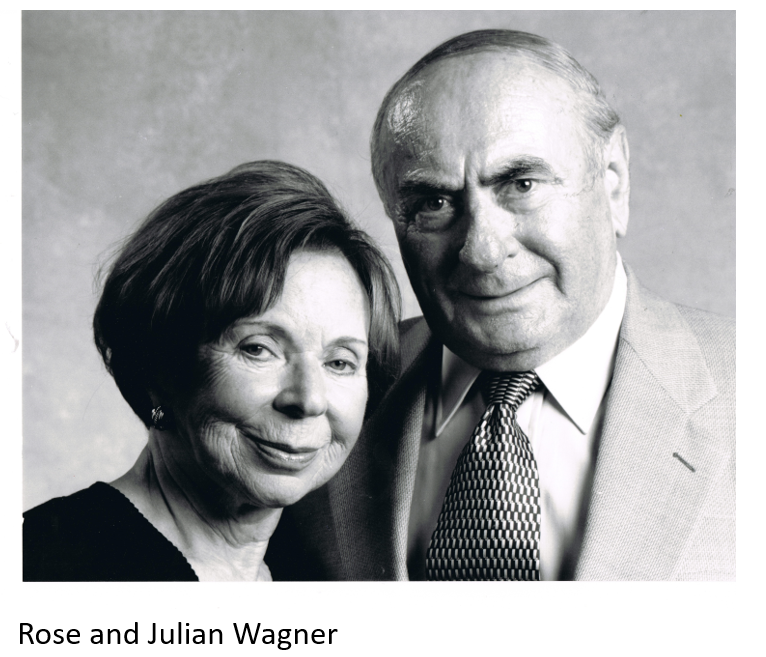Rose Wagner
"Do not forget what happened. Keep remembering."
Name at birth
Rose Srebrnogora
Date of birth
04/15/1926
Where did you grow up?
Lodz, Poland
Name of father, occupation
Lajbis Srebrnogora ,
CPA
Maiden name of mother, occupation
Gucia Widawska,
Homemaker
Immediate family (names, birth order)
My parents, my sister Adela, who lives in Israel, and me
How many in entire extended family?
Four or five aunts and cousins
Who survived the Holocaust?
Rose, Adela and Aunt Bronia Srebrnogora
I was taken to the Lodz Ghetto in 1939. My parents died in the Ghetto. My father had a heart attack and my mother had surgery and died.
My sister and I worked the entire time that we were in the ghetto; we made rugs in a factory. However, I was also in hiding for a long time because I was on the list to be deported. My sister was not on the list but she stayed with me. One day, in 1944 after the “Jewish President,” the head of the Lodz Jewish Council, Chaim Rumkowski, was already gone, while we were working we heard “Juden Raus!”( Jews Get Out!), someone had spotted us! So we ran into another building up to the second floor. When they came up the stairs, we jumped out of the second floor window. I hurt my back pretty bad.
While we lay there, a Nazi SS man came up to us. My sister spoke very good German so she spoke to him. He said “Why don’t you go to the camps? You will have food and clothing and be comfortable there.” My sister said, “no, we want to stay here.” So they took us to the hospital, which was overflowing. So we went back to the place we lived in the ghetto. When we got back there, everyone was gone, all my aunts and cousins. We lived on our own for a few weeks until we were found. In order to help hide me, sometimes our neighbor would put a padlock on the front door to our house so that it looked like there was no one inside.
The Nazis, in their black uniforms and high boots took us to the Marysin, (the train station with the cattle cars), where we boarded one of the cars.
The Nazis kept about 300 Jews in Lodz to clean it up. A man, who knew my father, saw me and, tried to save me. He took me down from the cattle car and gave me a pail of water to serve to the prisoners on the train. However when he saw me limping, he said the Nazis would shoot me. He said that I better get back on the train, so I did. We were shipped to Auschwitz.
After Auschwitz, I was shipped to Czechoslovakia to the Halbstadt concentration camp (part of Gross Rosen concentration camp system) where about 500 women worked in an ammunition factory. In about six months, we were liberated by the Russians.
My sister and I went back to Lodz but didn’t find anyone. My sister did meet her future husband there. After that I wound up in Berlin with a cousin of mine and just by chance, I ran into my sister. We then all smuggled our way into the American side.
Name of Ghetto(s)
Name of Concentration / Labor Camp(s)
Where were you in hiding?
In the Lodz Ghetto
What DP Camp were you after the war?
Zeilsheim, (Frankfurt, Germany) where I met my husband and was married. I was in the camp from 1946 – 1948.
Where did you go after being liberated?
United States
When did you come to the United States?
September 4, 1949
Where did you settle?
Memphis, Tennessee for nine months and then to Detroit where good friends lived. My eldest son, Lew, was born in Memphis
Occupation after the war
Homemaker
When and where were you married?
Zeilsheim, Germany
Spouse
Julian Wagner,
Real estate developer
Children
Lew (1950) real estate developer with father; Judy (1953) anesthesiologist; Renee (1960) works in an office
Grandchildren
Nine
What do you think helped you to survive?
I was not afraid. Even when I saw Nazis with guns, I wasn’t afraid because I was working.
What message would you like to leave for future generations?
Do not forget what happened. Keep remembering.
Interviewer:
Charles Silow
Interview date:
02/28/2011
To learn more about this survivor, please visit:
The Voice/Vision Holocaust Survivor Oral History Archive, University of Michigan
https://holocaust.umd.umich.edu/wagner/
https://holocaust.umd.umich.edu/wagner/
Survivor's map

